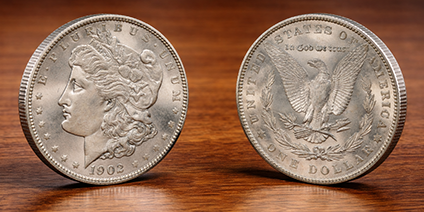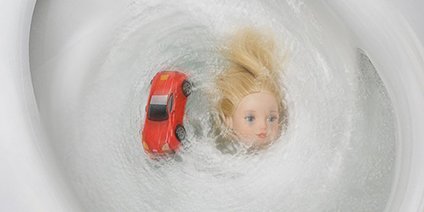Lost & Found
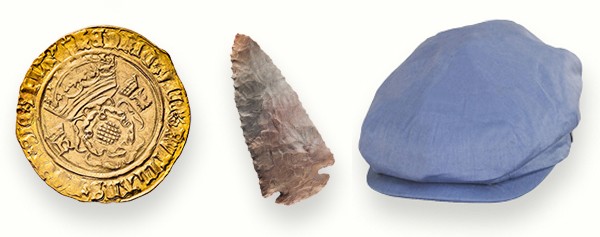
Lost & Found
I recently finished a Great Courses book about how our brains remember things. One of the points the author made was that our memory is selective by design. For instance, try to visualize every pet you ever had, or every car you ever owned, or every bicycle you ever rode. There are just too many things in a lifetime for our brains to keep track of.
Have you ever been digging around in your attic for the Christmas ornaments and discovered some item you purchased years ago and had totally forgotten about? Finding forgotten stuff is always fun because it lights up an area of our brain that’s been dormant. Finding stuff that someone else lost can be even more exciting because it holds an unknown story.
Valuable Foreign Stuff
Last week I read a story about a family in the U.K. who was relocating the fence around their flower bed and uncovered a lump of clay-like dirt embedded with multiple small metal discs. When the son sprayed it with the garden hose, the clod broke apart and revealed a trove of gold coins from the early 1500’s. A more thorough search yielded even more coins and the whole lot ultimately appraised at over $300,00.00
My first reaction was, “Why did it take them a thousand years to upgrade their flowerbed?” Then, I wondered why the story didn’t include the news of them purchasing a metal detector and new shovels, and digging up their entire lot — wasn’t there a Peter Fonda movie about that? For a few minutes (and I mean a very few), I even considered firing up my old metal detector and scouring my own yard. But, alas, I’m old and fat and lazy.
Valuable Local Stuff
A few years ago, my wife and daughter caught the arrowhead bug. They began traveling to various state parks where arrowheads could be found. Then, they got tired of driving long distances and began snooping around potential arrowhead troves nearer to home.
Due to an iron-clad non-disclosure agreement, I cannot tell you where they’ve been successful, but suffice it to say, if you live in North Texas, you’ve spent your entire life walking over arrowheads and other Native American artifacts. Actually, I should just say “Indian Artifacts” because at the time many of those arrowheads were made, shot, and lost, this area belonged not to America, but to Mexico (or whoever claimed ownership before them).
Regardless of where they came from, it’s amazing to ponder a random arrowhead and consider its history — who made it (male, female, young, old, slave, free person?), who taught them to make arrowheads (mother, father, uncle, the kid next-teepee?), how did they lose it (stuck in a buffalo, squirrel, rabbit, cowboy, or just bad aim?).
Not-So-Valuable Stuff
In 1971, my older sister gave me a blue denim cap she’d purchased at a market in England. At the time, I had long hair and drove a convertible, so the cap became an ever-present wardrobe item. It essentially lived in my car and my hair got stuffed into it every time the convertible top went down.
I loved that old cap — it may have been one of the most treasured birthday presents I ever received. Consequently, even after I sold the convertible, the cap remained among my favorite articles of clothing. Over a year later, when I headed off to college, the cap went with me. By then, it had become tattered and frayed (unlike the one pictured above) but I wore it every day, even though I no longer had long hair or a convertible.
Whenever a woman meets a man she considers worthy of marriage, she makes a secret list of things she intends to change about him. At the top of my wife’s list back when we were dating, was that blue denim cap. After we wed, the cap disappeared off and on for several years at a time. I kept assuming her jealousy towards my favorite cap had led to its secret demise, but then it would magically come back into my life — as if, perhaps, she’d only been torturing it.
Currently, my little blue friend is in the hibernation stage, but I have faith it will appear again in time to adorn my head during my future cremation.
People Stuff
So, what’s the point? You and I (and every other human being) carry around a butt-load of interesting information in the form of psychological baggage. I use that particular description because much of our baggage has the aroma of having emanated from that distinct point of origin. But role up your sleeves and root around in there and you might rediscover some good stuff.
We are surrounded by people — including ourselves — who’ve misplaced extremely valuable life lessons because we’re all so caught up in our present struggle for individual autonomy.
Much of what we humans carry around is as valuable as those gold coins but requires interaction — sometimes with total strangers — to be rediscovered.
Some of what we have to offer appears as useless as a flint arrowhead, but it has a backstory that is the essence of everything interesting. It just needs to be drawn out to be appreciated.
And some of our baggage is like my blue denim cap, infinitely important to the owner but exceeding the boundaries of others’ appreciation — not unlike that ugly college sweater, outgrown Speedo, or forty-year-old pair of sneakers that you keep hidden in the bottom of your own closet.
If my wife reads this, perhaps she’ll relent and release my favorite cap from exile yet again.
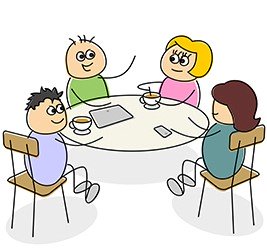 Let’s talk. I’d really like to hear what you have to say, and it might even give me something to write about. Email me at guy@lawsoncomm.com.
Let’s talk. I’d really like to hear what you have to say, and it might even give me something to write about. Email me at guy@lawsoncomm.com.
I’ll buy you coffee and we can compare notes. I promise not to steal your ideas without permission.
![]()
A clear conscience is the sure sign of a bad memory.
― Mark Twain

Did someone forward this newsletter to you after reading it themselves? Don’t settle for that!
CLICK HERE
to get a fresh, unused copy of this newsletter sent directly to you every Sunday morning. If you decide it stinks, you can always unsubscribe.
How Memory Works and Why Your Brain Remembers Wrong
— Gabrielle F. Principe
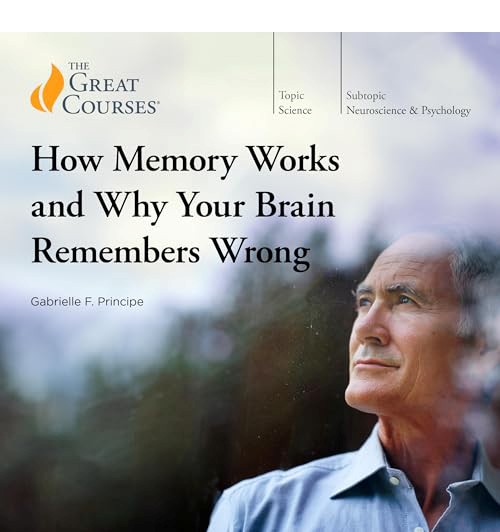
I can’t remember if I recommended this before but if you read it, you’ll understand why I can’t remember. You’ll also understand why everyone else forgets or mis-remembers stuff, and how we sometimes have vivid memories of stuff that never even happened. Brains are impressively complex and complex systems are subject to compounding of errors.
A meeting of great minds who think alike



